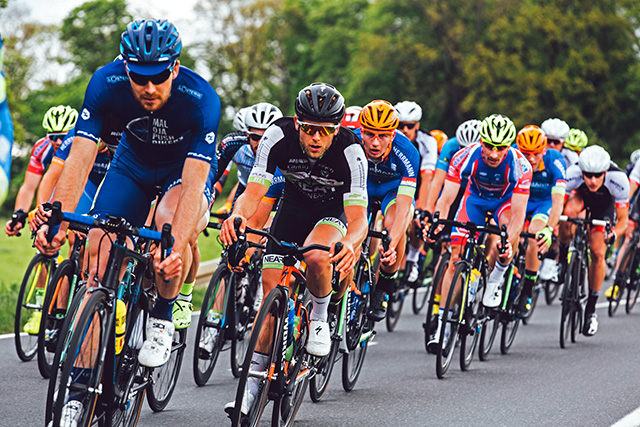Mental well-being is vital for athletes to perform at their best and enjoy long, fulfilling sports careers, as the unique pressures of competition can lead to mental health challenges like anxiety and depression.
 cycle race
cycle raceThis article explores the importance of mental health in sports, common issues athletes face and effective strategies to enhance mental well-being. Prioritizing mental health can improve performance and make sports more rewarding.
Why Mental Health Matters in Sports
When an athlete struggles in a crucial moment, it's often not just about physical ability or practice. Neglecting mental health can undermine judgment, reaction time, and effectiveness. Athletes focused on mental wellness tend to make better decisions and perform higher - the difference is clear.
Mental health issues like depression can seriously impact an athlete's career despite being prevalent. Symptoms like low energy and irritability can hinder consistent performance. Good mental health boosts abilities and maintains the joy of sports, preventing early retirement. Nurturing mental well-being is essential for thriving athletic careers.
Mental fatigue can be as damaging as physical fatigue. It slows reactions and reduces focus during competition. Sound mental health makes athletes sharper, make precise decisions, and perform optimally.
The contrast is stark - like night and day. While mental illness symptoms are common among elite athletes, even milder issues can hurt performance and enjoyment of the sport if left unaddressed. Diligent mental self-care is vital, alongside physical training.
Athletes can support their mental health through relaxation and recreational activities. Playing video games, for instance, can be an excellent way to unwind.
Investing in the best gaming console 2024 provides entertainment and a mental break from the pressures of competition.
This leisure time can help athletes recharge, improve their mood, and return to their sport with renewed focus and energy. Thus, incorporating gaming into their routine can be valuable for maintaining mental health and enhancing overall performance.
The Role of Coaches and Trainers in Supporting Mental Health
In their capacity as masterminds behind athletic environments, coaches and trainers have a reach beyond physical conditioning.
They are uniquely positioned to cultivate an atmosphere where mental well-being is recognized and vigorously encouraged.
When coaches acknowledge the courage required for athletes to face their mental health issues, they become instrumental in diminishing stigma and promoting an environment of transparency and support within the team.
Part of their duty involves ensuring athletes have access to quality medical care, which may encompass professional teams of doctors and therapists.
Being an athlete demands strength - in body and mind. Coaches build a space that lets the mind grow. This means treating mental health as key to doing well. Coaches guide fitness and guard the whole person - helping athletes build challenging minds.
Creating a Supportive Environment
Open talks on mental health start a nurturing team space. When coaches discuss mental health and have tools ready, it provides an understanding area. Athletes feel safe asking for help when needed. Building mental toughness is crucial. Coaches should push athletes to connect with others—team, a coach, family, and friends.
Using hand signs or colors in training lets athletes share feelings easily. Checking in during tense times like competitions or exams is vital. Coaches help balance sport and life. Their job is to grow people who are fit in body and mind.
Spotting Mental Struggles in Athletes
Coaches and trainers play a crucial role in detecting mental health issues early on. When an athlete acts out of character or performs poorly, it may signal deeper mental challenges.
Athletes themselves often feel different when dealing with injuries or mood issues, which is a clear sign for support teams to step in.
It's helpful when coaches understand these problems and can actively notice signs of distress, as this promotes better mental wellness for everyone involved in sports.
This prepares coaches and trainers to respond quickly with informed strategies. Providing education on awareness is crucial for ensuring athletes receive proper care to thrive personally and professionally.
 Creating a Supportive Environment
Creating a Supportive EnvironmentHelpful Approaches for Athletes
Tackling mental health head-on requires effective strategies. Athletes can access various approaches to navigate mental health challenges, including:
- Cognitive Behavioral Therapy (CBT)
- Mindfulness practices
- Visualization techniques
- Group and team-based therapies
These strategies are powerful allies in pursuing optimal mental health and performance.
Mental health support helps athletes cope with issues and enhance overall well-being. By using mental health experts and resources, athletes can overcome challenges and improve performance.
Cognitive Behavioral Therapy (CBT)
CBT aids athletes with mental health struggles. It focuses on:
- Shifting negative thoughts to positive ones, reducing anxiety and boosting performance
- Cognitive restructuring, where athletes identify stressors and respond positively
- Understanding that while some things are uncontrollable, perceptions and actions are controllable
CBT provides tools to overcome mental hurdles and reach full potential.
CBT is goal-oriented, guiding athletes toward realistic objectives for mental health and performance.
By improving psychological skills like motivation and mental focus, CBT is essential for peak performance.
Mindfulness and Visualization Techniques
Mindfulness and visualization are critical for an athlete's mental strategy. Coaches like Phil Jackson use breathing exercises and guided meditations to support athletes' mental health.
Mindfulness practices help athletes focus attention and tune into bodily sensations - skills crucial for peak performance under stress. These techniques can decrease anxiety while increasing psychological adaptability and overall athletic execution.
Being mindful leads to being okay with who you are. It also helps you care for yourself better. Mindfulness also makes you feel "in the zone" when doing things.
These things help you do well alone and with a team. Picturing stuff in your mind can also help you focus better. It lets you imagine success before it happens.
Group and Team-Based Therapies
Doing therapy with others is a way to feel good mentally. These methods bring people together and support each other. They help build strong ties, especially for teens.
Today, personal goals can make us feel alone. Group therapy shows how important it is to work as a team. It is a safe space to share, connect, and grow together. This builds the bond that winning teams need.
Building Resilience and Mental Toughness
Athletes use resilience and mental toughness to face hard times. To build these, they need to focus on self-growth.
They must be open to new things and stay positive when it's tough. Athletes build mental strength by finding their drive and setting both process and outcome goals.
Athletes face challenges, but planning helps lower stress and boosts confidence. Learning from tough times keeps their drive strong. Pursuing other interests aids mental recovery and a resilient mindset.
Related Pages
- Sports and Mental Health
- The Benefits of Physical Activity for our Brain — physical activity helps us reduce stress and increase our overall mood.
- Benefits of Exercise on Our Health
- Exercise and the Brain — regular exercise positively impacts brain function and your mental health.
- Study and Sports — Successfully juggling study and sports can increase your chance of graduating.
- Sport psychology factors of success in sports
- Benefits of Sports Psychology for Athletes


 Current Events
Current Events